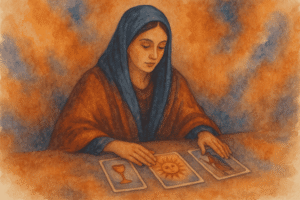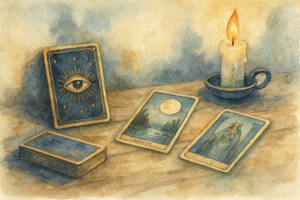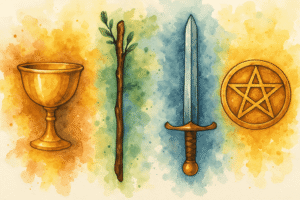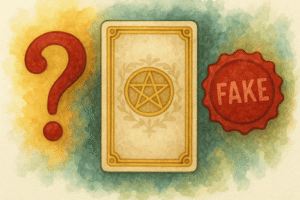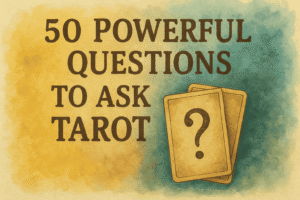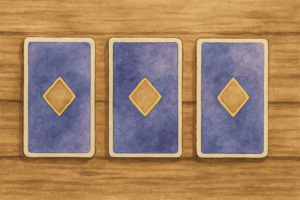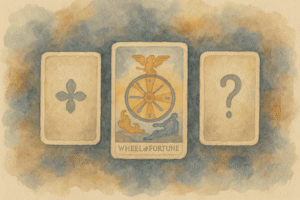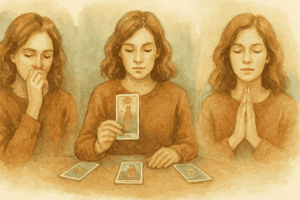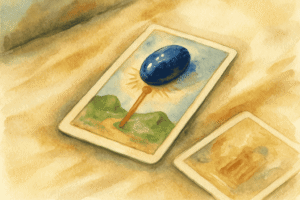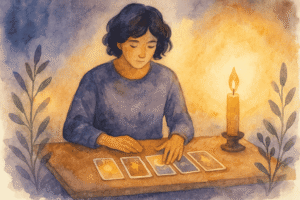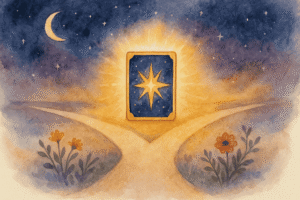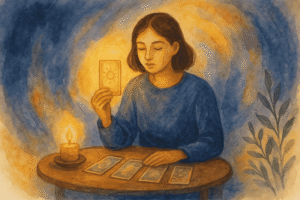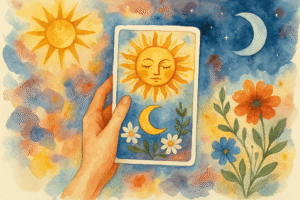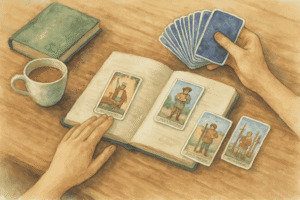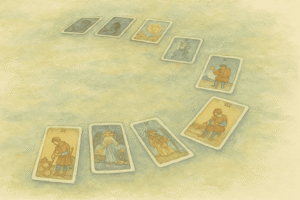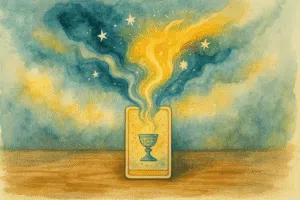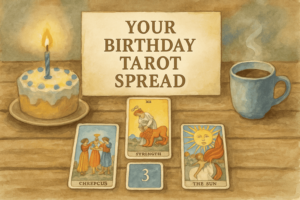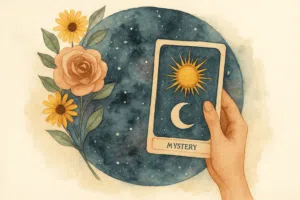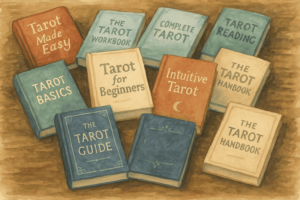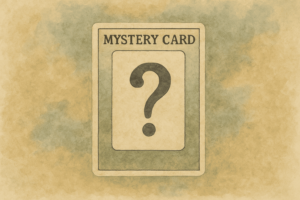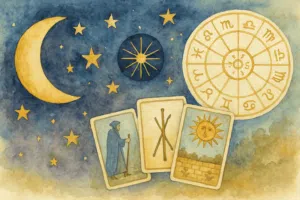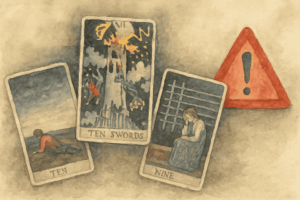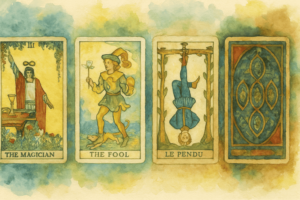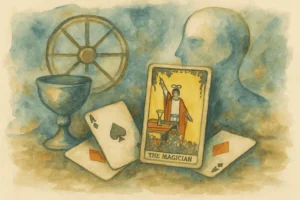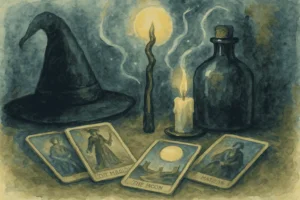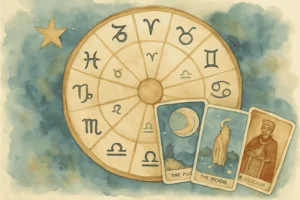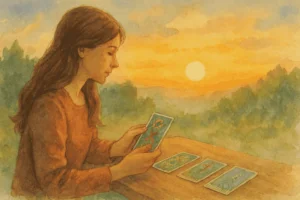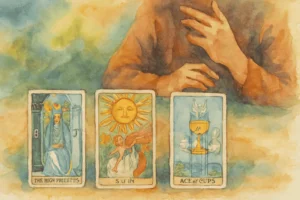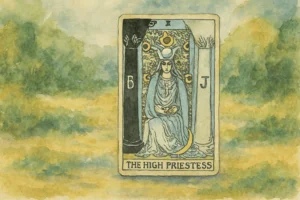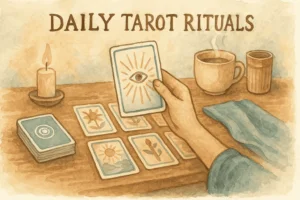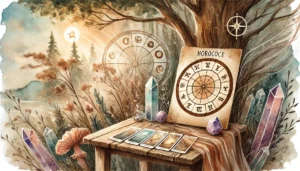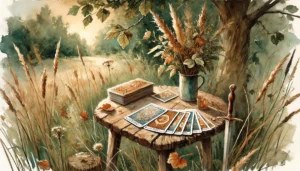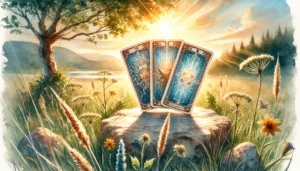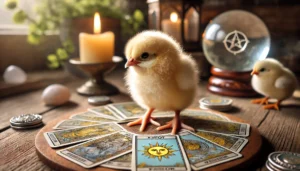Hiç bir tarot kartı çizip anında bir bağ hissettiğiniz, ancak sayılarının ardındaki daha derin anlamı anlamakta zorluk çektiğiniz oldu mu? Tarot ve numeroloji, hayatlarımız için derin içgörüler ve rehberlik sağlamak için güzel bir şekilde iç içe geçer. Her kart yalnızca imgeleriyle bir hikaye anlatmakla kalmaz, aynı zamanda sayısal özünde kök salmış sembolik anlamlarla da doludur. Tarot sayılarının anlamları dünyasına dalarak, sezgisel okumalarınızı geliştirebilir ve büyüme, meydan okuma ve ruhsal evrim katmanlarını keşfedebilirsiniz.
Tarot'ta Sayıların Önemi
Her tarot kartı, Minör Arkana'nın dört takımında yapı ve bağlam sağlayan doğal bir sayısal öneme sahiptir. 1'den 10'a ve ötesine kadar uzanan bu sayılar, hayat yolculuğumuz boyunca yankılanan temaları yansıtır ve kartları yorumlamada önemli bir rol oynar. Ortaya çıkardıkları desenler, çatışma ve çözüm döngülerini ve kişisel gelişimin geçişlerini tanımamıza yardımcı olarak yol gösterici ışıklar görevi görebilir.
1 – Başlangıçlar ve Potansiyel
Bir numara, yeni başlangıçların, hırsın ve potansiyelin güçlü bir sembolüdür. Tarotta, genellikle As kartlarında görünür. Örneğin, Değnek Ası ilham ve yaratıcılığı temsil eder, tutkulu bir çabanın başlangıcını işaret eder. Numeroloji bağlamında, bu enerji bizi yaratma ve tezahür ettirme yönündeki doğuştan gelen arzumuzu kucaklamaya teşvik eder.
2 – Dualite ve Denge
İki rakamı ortaklık, ikilik ve uyumla ilgilidir. İki Kupa Bağlantıları ve ilişkileri vurgularken, İki Kılıç kararsızlığa ve denge ihtiyacına işaret eder. Bu sayı sizi ilişkilerinizi keşfetmeye ve hayatınızdaki çatışmaya karşı işbirliğinin gücünü tanımaya davet ediyor.
3 – Büyüme ve Genişleme
Üç, yaratıcılığı, büyümeyi ve güçlerin birleşmesini ifade eder. Üç Tılsım takım çalışmasını ve ustalığı gösterirken, Üç Kılıç kalp ağrısı ve üzüntüyü temsil eder. Her üçü de sizi yaratıcı dürtülerinizi kucaklamaya ve başkalarıyla olan bağlantınızdaki zorluklardan ders çıkarmaya davet eder.
4 – İstikrar ve Yapı
Bu sayı istikrarı, temelleri ve düzeni sembolize eder. Dört Değnek uyum ve topluluğu kutlarken, Dört Tılsım katı kontrole karşı uyarır. Bu sayıdaki ikiliği anlamak, değişime açık kalırken istikrar aramamızı teşvik eder.
5 – Çatışma ve Değişim
Beş müjdeci çatışma, meydan okuma ve geçiştir. Beş Kupa kalp kırıklığı ve pişmanlık sunarken, Beş Kılıç ihanet ve çekişmeye karşı uyarır. Her beş, zorluklarla yüzleşmeniz ve çözüm aramanız için size güç verebilir, nihayetinde güç ve uyum yeteneği geliştirebilirsiniz.
6 – Uyum ve Denge
Altı, uyumu, sevgiyi ve şifayı temsil eder. Altı Kupanostaljiyi ve masumiyeti temsil ederken, Altı Kılıç geçişi ve ilerlemeyi gösterir. Bu sayı bizi hayatın sayısız deneyimleri arasında duygusal dengemizi yeniden ayarlamaya davet eder.
7 – Yansıma ve İçgörü
Yedi rakamı iç gözlemi ve ruhsal gelişimi teşvik eder. Yedi Değnek dayanıklılıktan bahsederken, Yedi Tılsım sabrı ve yeniden değerlendirmeyi vurgular. Bu sayı, hayatın denemelerinden bilgelik çıkarmamızı sağlayan daha derin bir öz-yansıtma çağrısıdır.
8 – Güç ve Kontrol
Sekiz, güç, otorite ve maddi başarıyı ifade eder. Sekiz Kılıç sıkışmışlık hissini temsil ederken, Sekiz Kupa artık bize hizmet etmeyen şeyleri geride bırakmaktan bahseder. Bu ikilik, gücün nerede elimizde olduğunu ve kontrolü nerede bırakmamız gerektiğini anlamamızı sağlar.
9 – Doruk ve Bilgelik
Tamamlanma sayısı olarak dokuz, doyum ve içsel bilgelikle rezonansa girer. Dokuz Kupa memnuniyet ve hoşnutluk kartıdır, Dokuz Kılıç kaygı ve kabusları yansıtır. Bu sayıyı keşfetmek bizi sonları ve getirdikleri içgörüleri kutlamaya teşvik eder.
10 – Tamamlama ve Yenileme
On rakamı tamamlanmayı ve yeni başlangıçların vaadini ifade eder. On Tılsım miras ve istikrarı sergilerken, On Kılıç acı dolu sonları ve teslimiyeti gösterir. Bu sayı bizi döngüler üzerinde düşünmeye ve zorluklardan sonra yeniden doğuşa hazırlanmaya teşvik eder.
Ana Sayılar ve Tekrarlayan Desenler
Başka bir olasılık katmanı ekleyerek, Majör Arkana'daki 11 ve 22 gibi Ana Sayılar - tıpkı Adalet Ve Aptal – daha derin içgörüler sunar. Bu sayılar genellikle artan ruhsal farkındalık ve potansiyeli gösterir. Ek olarak, bir yayılımda tekrar eden sayıları fark etmek, örneğin birden fazla üçlü, oyunda önemli temaları veya etkileri işaret edebilir ve sizi bu belirli enerjilere dikkat etmeye teşvik edebilir.
Tarot Numerolojisini Okumalarınıza Entegre Etmek
Tarot numerolojisini anlamak, tarot uygulamanızı dönüştürebilir ve okumalarınızda daha derin anlamları açığa çıkarmanıza yardımcı olabilir. İster deneyimli bir okuyucu olun ister yeni başlıyor olun, kartların ardındaki sayıları keşfetmek, hayatınızın anlatısındaki kalıpları ve temaları ayırt etmenizi sağlar. Kartları sayısal anlamları üzerinden yorumlayarak, daha zengin bir içgörü dokusu örebilir, duygusal refah ve kendini keşfetme yolculuğunuza yardımcı olabilirsiniz. Bunun pratikte nasıl işlediğini merak ediyorsanız, şuraya göz atmayı düşünün: ücretsiz çevrimiçi AI tarot Kart seçimlerinize göre kişiselleştirilmiş içgörüler sağlayabilen hizmetler.
Çözüm
Tarot içindeki sayıların gücünü benimsemek, ruhsal yolculuğumuzu zenginleştiren karmaşık bir anlam ağı ortaya çıkarır. Her sayının özünü açığa çıkarmak, sezgisel okumalarınızı geliştirir ve çoklu kart açılımlarına netlik katmanları ekler. Her açılım sizi hayatınızın döngülerini keşfetmeye, zorlukları ayırt etmeye ve büyümeyi kutlamaya davet eder. Unutmayın, bu sembolik sayıların sunduğu içgörüler sizi güçlenmeye ve amaca doğru yönlendirebilir.
Referanslar
- Smith, J. “Tarot'ta Numerolojinin Gücü,” 2021
- Psychology Today, “Tarot ve Sembolizmi Anlamak”, 2022
- Jones, L. “Numeroloji ve Manevi Uygulamalar Üzerindeki Etkisi”, 2020
- Brown, T. “Tarot Yorumlama Sanatı,” 2023


